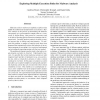Free Online Productivity Tools
i2Speak
i2Symbol
i2OCR
iTex2Img
iWeb2Print
iWeb2Shot
i2Type
iPdf2Split
iPdf2Merge
i2Bopomofo
i2Arabic
i2Style
i2Image
i2PDF
iLatex2Rtf
Sci2ools
143
click to vote
SP
2007
IEEE
2007
IEEE
Exploring Multiple Execution Paths for Malware Analysis
Malicious code (or malware) is defined as software that fulfills the deliberately harmful intent of an attacker. Malware analysis is the process of determining the behavior and purpose of a given malware sample (such as a virus, worm, or Trojan horse). This process is a necessary step to be able to develop effective detection techniques and removal tools. Currently, malware analysis is mostly a manual process that is tedious and time-intensive. To mitigate this problem, a number of analysis tools have been proposed that automatically extract the behavior of an unknown program by executing it in a restricted environment and recording the operating system calls that are invoked. The problem of dynamic analysis tools is that only a single program execution is observed. Unfortunately, however, it is possible that certain malicious actions are only triggered under specific circumstances (e.g., on a particular day, when a certain file is present, or when a certain command is received). ...
Related Content
| Added | 04 Jun 2010 |
| Updated | 04 Jun 2010 |
| Type | Conference |
| Year | 2007 |
| Where | SP |
| Authors | Andreas Moser, Christopher Krügel, Engin Kirda |
Comments (0)

